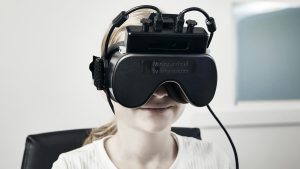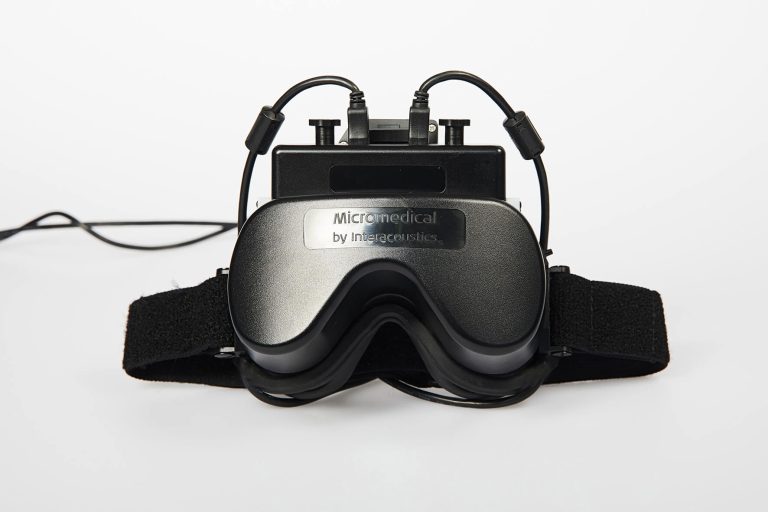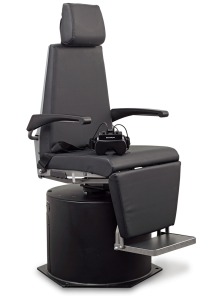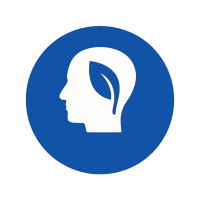Comprehensive Balance & Vestibular Testing

The University of South Florida Hearing Clinic specializes in advanced vestibular diagnostics to accurately assess and diagnose vestibular and/or balance disorders. Utilizing state of the art technology, including videonystagmography (VNG), Vestibular Evoked Myogenic Potentials (VEMP), and Rotary Chair Testing we provide precise evaluations to help your care team identify the cause of dizziness, vertigo, and imbalance. Our team comprises of experienced audiologists and vestibular specialists dedicated to providing accurate diagnosis and care.
The vestibular system plays a crucial role in maintaining postural control and gaze stability, allowing you to stay balanced and keep your vision clear while moving. It consists of three semicircular canals (horizontal, anterior, and superior canals) that detect rotational movements, two otolith organs (utricle and saccule) that sense linear movements (like riding in a car) and gravity. These structures send signals through the vestibular nerve (superior and inferior branches) to your brain, helping coordinate movement and balance.
If you have dysfunction in the vestibular system, this can lead to dizziness, vertigo, motion sensitivity, difficulty focusing while moving, or balance issues. If you are experiencing these symptoms, we encourage you to schedule a comprehensive evaluation at our clinic. With our testing, we can help you take your first step toward proper management and treatment, ensuring you get the care you need from experienced vestibular audiologists. Early and accurate diagnosis is the first step toward effective management and improved quality of life.
If you experience frequent dizziness, vertigo, or unsteadiness, The University of South Florida Vestibular and Balance Clinic offers comprehensive vestibular testing to help find answers. Vestibular testing is a series of specialized exams that check how your inner ear vestibular system is working. It is an important step in the diagnosis of dizziness and vertigo, allowing ENT, neurologists, physicians, and physician assistants to pinpoint the cause of your symptoms and guide management strategies.
What Is Vestibular Testing?
Vestibular testing refers to a battery of tests that evaluate the balance organs in your inner ear and their connections to the brain. The vestibular system plays a crucial role in maintaining postural control and gaze stability, allowing you to stay balanced and keep your vision clear while moving. Your vestibular system consists of small gyroscope-like structures; three semicircular canals (horizontal, anterior, and superior canals) that detect rotational movements, two otolith organs (utricle and saccule) that sense linear movements (like riding in a car) and gravity. These structures send signals through the vestibular nerve (superior and inferior branches) to your brain. Together, with your vision and muscles/joints, this inner ear system helps maintain your balance. If something is off in your vestibular system, you can feel dizzy, lightheaded, or like the world is spinning (vertigo).
During vestibular testing, your audiology team will guide you through a series of non-invasive exams to see how your eyes and body react to certain movements and stimuli. We can look at vestibular reflexes called the vestibulo-ocular reflex (VOR) that links the inner ear to eye movements. By monitoring eye responses, we can get a window into the inner ear to tell if the balance organs are working like they should.
Why Is Vestibular Testing Important?
Dizziness and balance problems can have many causes, including inner ear disorders, vision disorders, neurological conditions, heart/blood pressure problems, medication side effects, and others. It is not always clear why a patient experiences dizziness or unsteadiness and vestibular testing is important because it can help determine if your problems are due to the inner ear vestibular system. If your vestibular tests show an inner ear abnormality, your provider may be able to diagnose the cause and recommend appropriate treatment. If your tests are normal, this is also helpful because your provider can look at other causes of your dizziness or unsteadiness. This ensures that you receive patient centered, evidence-based care to help with your symptoms.
Vestibular testing is a key step in diagnosing common vestibular disorders, including benign paroxysmal position vertigo (BPPV), labyrinthitis, vestibular neuritis, Meniere’s disease, and vestibular migraine. By investing time in a thorough vestibular evaluation now, you and your doctors are one step closer to finding an effective management plan for your symptoms.
Another reason vestibular testing is important is safety. People with inner ear vestibular disorders are at a higher risk of falls and injuries. Proper vestibular evaluation can allow for prompt treatment and vestibular rehabilitation, which can improve stability and prevent falls.
Overview of Vestibular Tests
Utilizing state of the art technology, including videonystagmography (VNG), Rotary Chair Testing, and Vestibular Evoked Myogenic Potentials (VEMP) we provide precise evaluations to help your care team identify the cause of dizziness, vertigo, and imbalance. Our team comprises of experienced audiologists and vestibular specialists dedicated to providing accurate diagnosis and care.
Hearing Evaluation
If you have never received a hearing evaluation, our team will measure your hearing. Since the vestibular and hearing organs share similar fluids and nerves, it is an important step on your overall vestibular and balance evaluation.

Videonystagmography (VNG)
VNG is a comprehensive tests that evaluate the nerves and areas of the brain that control eye movements and the functionality of the inner ear. During this procedure, we can measure eye movements using specialized goggles. The test involves tracking visual targets, positional changes, and caloric stimulation. These assessments help detect abnormalities in the vestibular system and central nervous system. One portion of the VNG involves gently introducing warm or cool air into each ear canal, one ear at a time, which is called caloric testing. The temperature change stimulates the inner ear balance organ and usually causes a brief vertigo sensation and involuntary eye movement (nystagmus). Feeling dizzy for a short period during this part is normal and expected. The VNG is helpful in diagnosing or ruling out BPPV, vestibular neuritis, and other disorders by analyzing your nystagmus.
Vestibular Evoked Myogenic Potentials (VEMP)
VEMPs assess the integrity of the otolith organs and the vestibular nerve, components of the inner ear balance system. This non-invasive test measures the muscle responses of the eyes (oVEMP) and neck (cVEMP) in reaction to sounds. Results can provide insight into vestibular function and help identify specific disorders. For this test we will place sticker like electrodes on your skin and you will hear a series of clicks. The electrodes will measure tiny reflex responses in your neck or eye muscles in reaction to the sound. You won’t feel those responses as they are very small electrical signals in your neck. The presence or absence of the reflexes tells us if the otolith pathways are intact. It’s a brief test that is well tolerated.

Rotary Chair
The rotary chair test is a comfortable and non-invasive way to evaluate how well your inner ear and brain work together to maintain balance. During the test, you’ll sit in a motorized chair that gently rotates while you wear special goggles to track your eye movements. These movements help your audiologist understand how your vestibular system is functioning, which is especially helpful if you’ve been experiencing dizziness or imbalance. The test is safe, typically takes less than an hour, and provides valuable insights that guide your personalized care plan.
Common Vestibular Disorders
Vestibular testing can help diagnose or rule out a number of vestibular disorders. Here are some of the common vestibular disorders that these tests can help identify.
Benign Paroxysmal Positional Vertigo (BPPV)
BPPV is a common inner ear disorder that causes brief (15 seconds to a couple of minutes), intense vertigo (spinning) with certain head movements such as rolling over in bed, getting up or lying down in bed, looking up or down, or other movements. It is due to the calcium crystals (otoconia) are out of place and disturb the balance sensors. Vestibular tests such as the Dix-Hallpike or roll test can diagnose BPPV. The good news is that BPPV is easily treatable by audiologists or physical therapists to reposition the otoconia.
Labyrinthitis and Vestibular Neuritis
These are inner ear vestibular infections or inflammation. Vestibular neuritis is an inflammation of the vestibular nerve, causing sudden and severe vertigo, balance problems, and no hearing loss. Labyrinthitis involves inflammation of both the balance and hearing nerves or organs of the inner ear, causing both vertigo and sudden hearing loss, and sometimes tinnitus. Symptoms from either can be intense, often lasting for days. Early diagnosis is key, as medications and vestibular therapy can help recovery.
Meniere’s Disease
Meniere’s Disease is a chronic inner ear disorder caused by a fluid imbalance. It can lead to vertigo, fluctuating hearing, a feeling of fullness in the ear, and roaring tinnitus. An episode can last minutes to hours, and a person may feel asymptomatic in between episodes. Knowing if it is Meniere’s Disease is important because treatment may include diet changes, medication, or other interventions to manage the fluid imbalance.
Vestibular Migraine
Vestibular migraines is a neurological condition in which migraine attacks cause vertigo, dizziness, imbalance, motion sensitivity, nausea, and/or feeling disoriented. These can be more challenging to diagnose in between episodes, but vestibular testing can rule out other causes. If the inner ear tests are normal, but symptoms fit a migraine pattern, a diagnosis of vestibular migraines may be made. Treatment will focus on migraine management instead of traditional vestibular rehabilitation.
Other Causes
There are a variety of other causes, including non-vestibular causes such as medication side effects, abnormal blood pressure, or neurological conditions. In these cases, vestibular testing can rule out inner ear vestibular causes, so your doctor can focus on other areas.
What To Expect During Vestibular Testing
During vestibular testing, you will wear specialized goggles or have sticker electrodes on your skin that will allow your vestibular team to track your eye movements. Vestibular appointments usually last 2 to 3 hours. Testing is completed in a quiet, dimly lit room. Our team will be with you the whole time, explaining each step and making sure you are as comfortable as possible.
For each part of the test, your vestibular team will give you instructions on what you need to do. You may need to follow a light, turn your head in certain directions, or tell us what you are feeling. Do not hesitate to speak up if you need a break, the testing can be slowed or stopped at any time.
Once testing is completed, we will make sure you feel steady enough to leave. It is common to feel a little unsteady, tired, or lightheaded after testing. This usually passes quickly, but you should not plan on driving yourself home. We strongly recommend you have someone with you to drive you home.
How Do I Prepare For My Vestibular Tests?
In order to obtain accurate results, please review and follow the instructions carefully:
- Get a full-night’s sleep before the test so that you come fully rested.
- Wear comfortable clothing (preferably slacks) as you will be lying on a table.
- Do not wear any makeup, including mascara and eye liner, or facial lotions.
- These can interfere with proper recordings.
- If you wear glasses or contacts, please bring them.
- Medications greatly influence test results. For 48 hours prior to your test, DO NOT TAKE ANY OF THE FOLLOWING:
- Antihistamines/Decongestants: (Benadryl, Dimetapp, Triaminic, Claritin, etc…)
- Sedatives/Sleeping Pills: (Halicion, Restoril, etc…)
- Tranquilizers: (Valium, Librium, Atarax, Serax, etc…)
- Pain relievers/Analgesics/Narcotics: (Aspirin, Codeine, Demerol, Percocet, etc…)
- Stimulants/Amphetamines/Appetite Suppressants
- Anti-nausea/Anti-Dizziness Medication: (Antivert, Meclizine, Dramamine, Diuretics, etc…)
- Vital medications SHOULD NOT be stopped. Continue to take your medications for heart, blood pressure, thyroid, anticoagulants, birth control, antidepressants, and diabetes. If you are unsure about discontinuing a particular medication, please call your physician to determine if it is medically safe for you to be without them for 48 hours.
- Refrain from consuming alcoholic beverages for 24 hours before the test.
- Do not eat or drink for 4 hours prior to your test. If you are diabetic or prone to lightheadedness, you may have a small, light meal, or glass of juice.
- Bring someone along with you who can drive you home as this test may leave you with short-lived feelings of imbalance.
Do You Offer Treatment Options?
Our primary focus is vestibular diagnostics and we collaborate closely with a network of specialists to ensure you receive appropriate treatment and management for your condition.
